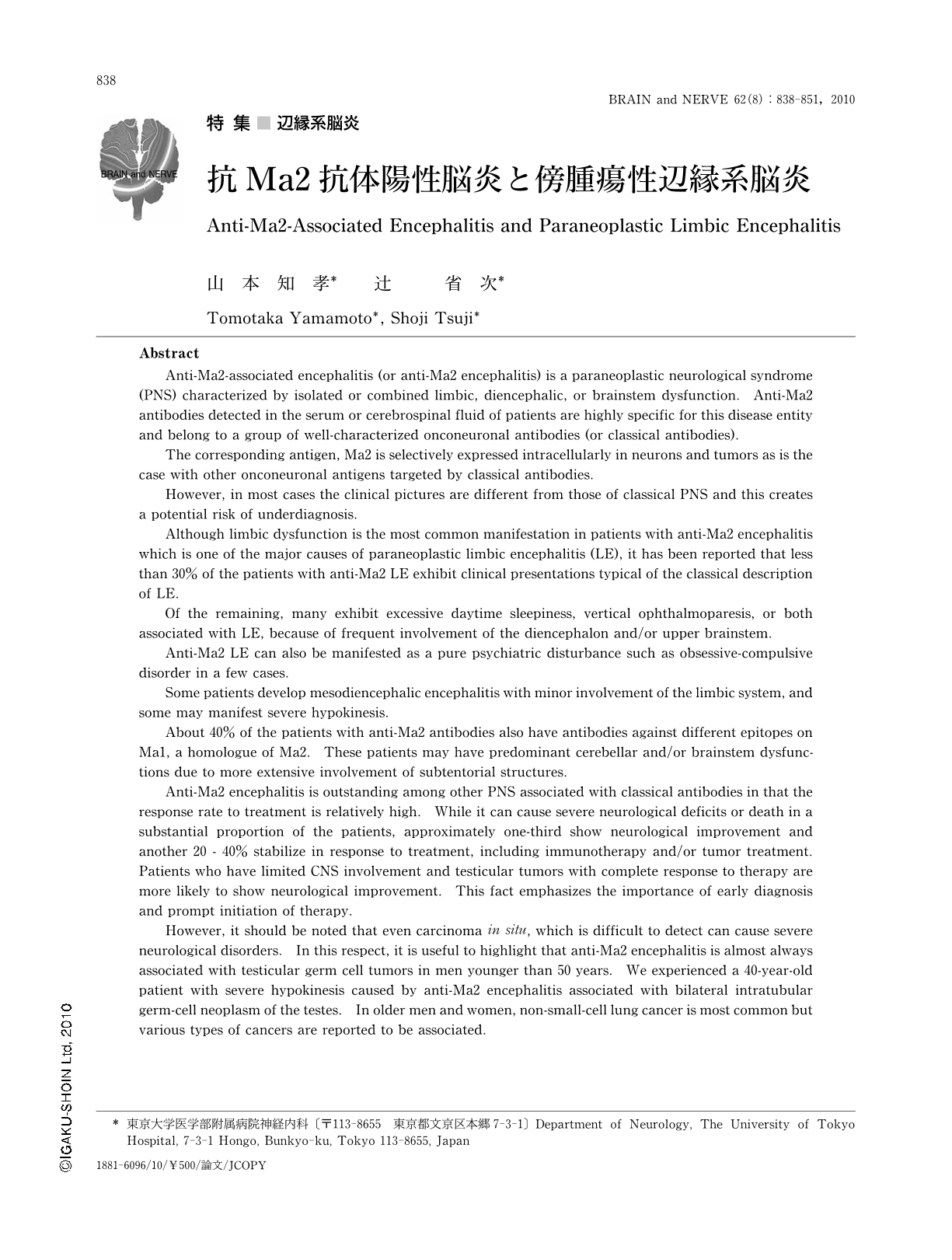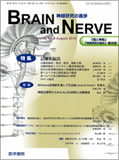Japanese
English
- 有料閲覧
- Abstract 文献概要
- 1ページ目 Look Inside
- 参考文献 Reference
はじめに
Anti-Ma2-associated encephalitis(本稿では,抗Ma2抗体陽性脳炎と表記する)は,細胞内のonconeuronal antigenであるMa2に対する抗体の存在を特徴とする傍腫瘍性神経症候群(paraneoplastic neurological syndromes:PNS)の1つであり,辺縁系脳炎をはじめとした特徴的な症候群を呈する。抗Ma2抗体は,同様に傍腫瘍性辺縁系脳炎に関連し,神経細胞内抗原と結合する抗Hu抗体,抗CV2/CRMP5抗体,抗amphiphysin抗体などとともに,いわゆるwell-characterized onconeuronal antibodies1)に分類され(最近はPNS-related onconeuronal antibodiesという分類も提唱されている2)が,本稿では文字数の関係もあり古典的抗体と表記する),PNSにおける診断的意義が確立しているが,病態における抗体の役割は未解明である。
一般に細胞内抗原を標的とする抗体を伴う傍腫瘍性脳炎の場合には,神経伝達物質受容体などの細胞表面抗原に対する抗体を伴う自己免疫性脳炎の場合と異なり,治療による神経症状の改善が期待できないと考えられている。しかし,抗Ma2抗体陽性脳炎は,早期治療に反応する症例が少なくない点で際立っている3)。特に治療効果が期待されるのは原発腫瘍が限局性の精巣腫瘍の場合であるが,性別や年齢などの患者背景がそろえば精巣腫瘍の存在を極めて正確に予測できる点も大きな特徴である。しかし,臨床診断が極めて困難な上皮内癌の段階でも重篤な神経傷害をきたし得るというジレンマも抱えている4)。
このように,抗Ma2抗体陽性脳炎は早期の診断治療を必要とする,辺縁系脳炎の重要な鑑別診断の1つであるが,PNSとしての古典的症候群と異なる臨床像を呈する場合が多い点に注意が必要である。本稿では,自験例の提示とともに,本疾患の臨床的特徴について概説する。
Abstract
Anti-Ma2-associated encephalitis (or anti-Ma2 encephalitis) is a paraneoplastic neurological syndrome (PNS) characterized by isolated or combined limbic, diencephalic, or brainstem dysfunction. Anti-Ma2 antibodies detected in the serum or cerebrospinal fluid of patients are highly specific for this disease entity and belong to a group of well-characterized onconeuronal antibodies (or classical antibodies).
The corresponding antigen, Ma2 is selectively expressed intracellularly in neurons and tumors as is the case with other onconeuronal antigens targeted by classical antibodies.
However, in most cases the clinical pictures are different from those of classical PNS and this creates a potential risk of underdiagnosis.
Although limbic dysfunction is the most common manifestation in patients with anti-Ma2 encephalitis which is one of the major causes of paraneoplastic limbic encephalitis (LE), it has been reported that less than 30% of the patients with anti-Ma2 LE exhibit clinical presentations typical of the classical description of LE.
Of the remaining, many exhibit excessive daytime sleepiness, vertical ophthalmoparesis, or both associated with LE, because of frequent involvement of the diencephalon and/or upper brainstem.
Anti-Ma2 LE can also be manifested as a pure psychiatric disturbance such as obsessive-compulsive disorder in a few cases.
Some patients develop mesodiencephalic encephalitis with minor involvement of the limbic system, and some may manifest severe hypokinesis.
About 40% of the patients with anti-Ma2 antibodies also have antibodies against different epitopes on Ma1, a homologue of Ma2. These patients may have predominant cerebellar and/or brainstem dysfunctions due to more extensive involvement of subtentorial structures.
Anti-Ma2 encephalitis is outstanding among other PNS associated with classical antibodies in that the response rate to treatment is relatively high. While it can cause severe neurological deficits or death in a substantial proportion of the patients, approximately one-third show neurological improvement and another 20 - 40% stabilize in response to treatment, including immunotherapy and/or tumor treatment. Patients who have limited CNS involvement and testicular tumors with complete response to therapy are more likely to show neurological improvement. This fact emphasizes the importance of early diagnosis and prompt initiation of therapy.
However, it should be noted that even carcinoma in situ, which is difficult to detect can cause severe neurological disorders. In this respect, it is useful to highlight that anti-Ma2 encephalitis is almost always associated with testicular germ cell tumors in men younger than 50 years. We experienced a 40-year-old patient with severe hypokinesis caused by anti-Ma2 encephalitis associated with bilateral intratubular germ-cell neoplasm of the testes. In older men and women, non-small-cell lung cancer is most common but various types of cancers are reported to be associated.
In this study,in addition to reviewing the above case we have reviewed the significance of anti-Ma2 antibodies in the diagnosis of anti-Ma2 encephalitis and the clinical features of this disease.

Copyright © 2010, Igaku-Shoin Ltd. All rights reserved.


